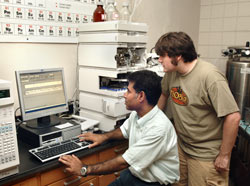Inside Iowa State
Inside ArchivesSubmit newsSend news for Inside to inside@iastate.edu, or call (515) 294-7065. See publication dates, deadlines. About InsideInside Iowa State, a newspaper for faculty and staff, is published by the Office of University Relations. |
June 8, 2006 Gilman instrumentation lab is like no otherby Anne Krapfl State-of-the-art analytical equipment for undergraduate and graduate chemistry students to learn from and master -- minus the crippling financial cost to the department. Sound unlikely in these lean budget years? For many years, equipment vendors have been providing the chemistry department hundreds of thousands of dollars worth of new equipment at no charge. Both the university and the companies benefit. Students get hands-on time with the latest equipment. Companies get their products in the hands of tomorrow's (and today's) technical employees. 
Basudeb Saha (seated) and senior chemistry student Michael Eller review results on a monitor provided from the single quad liquid chromatograph mass spectrometer (to their right) in the Gilman instrumental analysis lab. The spectrometer is one of 13 instruments provided for five years to ISU at no cost by their manufacturers. Photo by Bob Elbert. The chemistry department and ISU Purchasing are in a third contract, spanning about 15 years in total, with equipment vendors for new machines that detect the makeup and qualities of gases and liquids. The latest contract, competitively bid by ISU Purchasing, includes 14 machines -- valued at about $795,000 -- from three companies. (The product list is at the end of this story.) That's enough to fill two teaching labs in Gilman Hall. Some pieces are as small as a breadbox; others take the equivalent floor space of a desk. All are provided at no charge. According to the contract, the vendors provide new-generation models as they become ready for market. "We're a resource that academic departments can use. These contracts are formed as the result of open competitive bidding," said purchasing agent Al Brooks. "Our bid process conforms to those used by the other regent universities, the state of Iowa and federal government." Good for ISUBasudeb Saha manages the instrumental analysis lab as part of his supervisory duties for the chemistry department. In the fall, 30 senior-level chemistry undergrads use the lab for a required course in the use of the analytical instruments. Every year, five to eight graduate students, representing various chemistry research groups, use equipment in the labs regularly. Other research groups from around campus also use -- and are welcome to use -- the lab, Saha said. He has trained scientists and students from, for example, environmental engineering, food science, biochemistry, agronomy and the Center for Sustainable Environmental Technologies to use various pieces of equipment. They do their own work; Saha said he checks their outcomes to make sure the equipment worked as it's designed to. "I'll train you, you run your own tests," he explained. "We don't own this equipment, so there's no policy in place to charge anyone to use it." Contact Saha, basudeb@iastate.edu, if you are interested in short-term use of equipment in the demonstration lab. The "demonstration" lab has become an important component in chemistry's undergraduate education and prospective chemistry students see the lab as part of their campus tour. "It's a very good recruitment tool of undergraduate students," Saha noted. What's the catch?While there are many benefits to Iowa State, the companies benefit from the contract, too. ISU students have become a secondary market of sorts to them. Whether they move into academic work or industry after graduating, they likely will have a say in what equipment their employers will purchase for them to use. They also likely will recommend equipment they know and have hands-on experience with. Prospective buyers, at Iowa State or elsewhere in the state, are directed by the vendors to the demonstration lab in Gilman to try out instruments they're looking to purchase, or to compare similar products from two companies. Saha said he receives outside requests for demonstrations six to eight times a year. And, because it's a cooperative purchasing agreement, any agency of the state of Iowa can use the university's contract to purchase equipment from the three companies (Varian Inc., Agilent Technologies or Beckman Coulter Inc.), thus avoiding the usual competitive bidding process for items in this price range. Saha said the "maintenance" aspects of the lab are vastly outnumbered by the benefits to having a state-of-the-art analytical chemistry lab on campus. Without the contract with the vendors, it wouldn't happen. To make his point, he said the department has been seeking funding for about two years for a DSC (differential scanning calorimeter), which costs about $25,000. None of the three companies selected in the bidding process offer a DSC. But, after several years of persistence, he is hopeful the department will purchase one that is ready to go for fall semester. Equipment installed in the Gilman undergraduate instrumentation lab: Varian Inc.
Agilent Technologies
Beckman Coulter Inc.
|
Quote"I'll train you, you run your own tests. We don't own this equipment, so there's no policy in place to charge anyone to use it." -- Basudeb Saha, supervisor of analytical and physical chemistry labs |